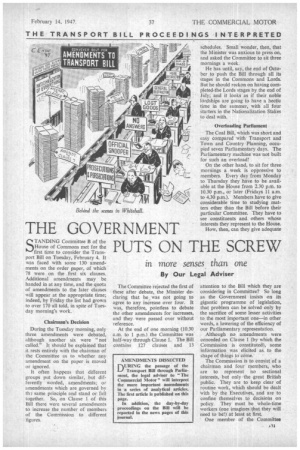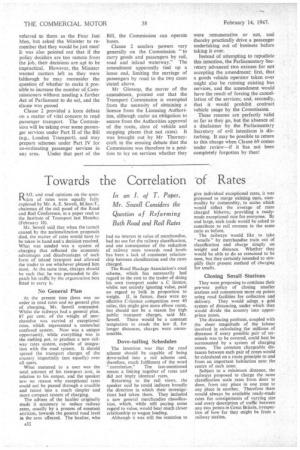THE GOVERNMENT PUTS ON THE SCREW
Page 33

Page 34

If you've noticed an error in this article please click here to report it so we can fix it.
in more senses than one
By Our Legal Adviser
STANDING Committee B of the House of Commons met for the first time to consider the Transport Bill on Tuesday, February 4. It was faced with some 130 amendments on the order paper, of which 78 were on the first six clauses. Additional amendments may be handed in at any time, and the quota of amendments to the later clauses will appear at the appropriate time; indeed, by Friday the list had grown to over 170 all told, in spite of Tuesday morning's work.
Chairman's Decision During the Tuesday morning, only three amendments were debated, although another six were "not called." It should be explained that it rests entirely with the chairman of the Committee as to whether any amendment on the paper is moved or ignored.
It often happens that different groups put down similar, but differently worded, amendments; or amendments which are governed by tin same principle and stand or fail together. So, on Clause I of this Bill there were several amendments to increase the number of members of the Commission to different figures. The Committee rejected the first of these after debate, the Minister declaring that he was not going to agree to any increase over four. It was, therefore, pointless to debate the other amendments for increases, and they were passed over without reference.
At the end of one morning (10.30 a.m. to 1 p.m.) the Committee was half-way through Clause 1. The Bill contains 127 clauses and 13 schedules. Small wonder, then, that the Minister was anxious to press on, and asked the Committee to sit three mornings a week.
He has until, say, the end of October to push the Bill through all its stages in the Commons and Lords. But he should reckon on having cornpleted.the Lords stages by the end of July; and it looks as if their noble lordships are going to have a hectic time in the summer, with all four starters in the Nationalization Stakes to deal with. • • Overloading Parliament • The Coal Bill, which was short and easy compared with Transport and Town and Country Planning, occupied seven Parliamentary days. The Parliamentary machine was not built for such an overload!
On the other hand, to sit for three mornings a week is oppressive to members. Every day from Monday to Thursday they have to be available at the House from 2.30 p.m. to 10.30 p.m., or later (Fridays 11 a.m. to 4.30 p.m.). Members have to give considerable time to studying matters other than the Bill before their particular Committee. They have to see constituents and others whose interests they represent to the House.
How, then, can they give adequate attention to the Bill which they are considering in Committee? So long as the Government insists on its gigantic programme of legislation, that problem can be solved only by the sacrifice of some lesser activities to the most important one—in other words, a lowering of the efficiency of our Parliamentary representation.
Although no amendments were conceded on Clause 1 (by which the Commission is constituted), some information was elicited as to the shape of things to come.
The Commission is to consist of a chairman and four members, who are to represent no sectional interests, but only the great British public. They are to keep clear of routine work, which should be dealt with by the Executives, and are to confine themselves to decisions on policy. They must be whole-time workers (one imagines That they will need to be!). at least at first.
One member of the Committee A31 referred to them as the Four Just Men, but asked the Minister to remember that they would be just men! It was also pointed out that if the policy deciders are too remote from the job, their decisions are apt to be impractical, However, the Minister wanted matters left as they were (although he may reconsider the question of whether to make it possible to increase the number of Commissioners without needing a further Act of Parliament to do so), and the clause was passed Clause 2 provided a keen debate on a matter of vital concern to road passenger transport. The Commission will be taking over some passenger services under Part II of the Bill (e.g., London Transport), and may prepare schemes under Part IV for co-ordinating passenger services in any area. Under that part of the Bill, the Commission can operate buses.
Clause 2 confers powers very generally on the Commission "to carry goods and passengers by rail, road and inland waterway." The amendment apparently tied up a loose end, limiting the carriage of passengers by road to the two cases stated above.
Mr Glossop, the mover of the amendment, pointed out that the Transport Commission is exempted from the necessity of obtaining a licence from the Licensing Authorities, although under an obligation to secure from the Authorities approval of the route, class of vehicle and stopping places (but not rates). It was brought out by Mr Thorneycroft in the ensuing debate that the Commission was therefore in a position to lay on services whether they were remunerative or not, and thereby practically drive a passenger undertaking out of business before taking it over.
Instead of attempting to repudiate this intention, the Parliamentary Secretary advanced two excuses for not accepting the amendment: first, that a goods vehicle operator taken over might also be running existing bus services, and the amendment would have the result of forcing the cancellation of the services; and, secondly, that it would prohibit contract vehicle usage by the Commission.
These reasons are perfectly valid as far as they go, but the absence of a disclaimer by the Parliamentary Secretary of evil intentions is disturbing. It may be possible to return to this 'charge when Clause 69 comes under review—if it has not been completely forgotten by then!












































































